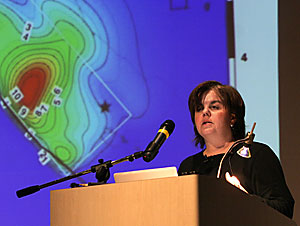 |
|
CLAIR C. LAURENCE/Arizona Daily Wildcat
|
Geoscience department head Dr. Susan Beck presented a geologic perspective on the Dec. 26, 2004 Sumatra earthquake and tsunami disaster yesterday afternoon at the Student Union Memorial Center.
|
|
|
By Cassie Blombaum
Arizona Daily Wildcat
Wednesday, January 19, 2005
Print this
Professors speak on distaster in Gallagher Theater
Four UA professors gathered yesterday to discuss the geological, political and social effects of the recent tsunami and earthquake, which hit Southeast Asia and Africa.
The Sumatra earthquake occurred due to shifting tectonic plates in the Indian Ocean, a problem that could have been avoided if a proper warning system were implemented in the region, said Susan Beck, professor of geosciences.
"A plate within the Indian Ocean is moving toward the northeast at a rate of 5 to 6 cm a year. When plates move and pressure builds up, earthquakes can result," Beck said.
The forum was held in the South Ballroom of the Student Union Memorial Center and included lectures from Beck, Richard Eaton, history professor, G. Marie Swanson, dean and professor of Mel & Enid Zuckerman Arizona College of Public Health, and J. Stephen Lansing, anthropology professor.
Beck discussed the geological perspectives of the powerful earthquake that caused the tsunami and said the natural disaster was "really the most significant event in the last 100 years."
"It was truly a defining moment for all of us," Beck said.
Beck said the phenomenon not only affected areas of South Asia and Africa but also had implications around the world.
"It caused the earth to oscillate, meaning that it tilted the earth by a couple of centimeters," Beck said.
The speakers designed Power Point presentations with photographs, video footage, charts and facts to help the audience understand the geological mechanics of the earthquake and tsunami, as well as the damage those regions suffered.
"The forum, especially Dr. Beck's speech, really made me see how powerful mother earth really is," said Elizabeth Doran, an undeclared freshman.
Eaton focused his lecture on the relations between history, politics and natural disasters.
"I'm especially interested in the ways natural disasters have served as catalysts of political and religious movements," Eaton said.
Eaton spoke of the ways in which humankind throughout history has associated natural disasters with the "wrath of God."
Eaton gave the example of the 1923 earthquake that struck Japan and killed more than 100,000 people, virtually leveling every factory. Eaton said a number of survivors "blamed the event on Japanese acceptance of Western modernity and culture."
However, Eaton said natural disasters can also serve to overcome political differences.
After the horrific 1999 earthquake in Turkey, for example, Greece buried the hatchet, so to speak, and offered Turkey a helping hand. Greece also eventually suffered an earthquake, and in return, Turkey provided aid, Eaton said.
When asked about the political implications of Sri Lanka and Acheh, a region in the northern part of the island of Sumatra, Eaton said, "the next several months will be critical as to which (political) directions (they) might take."
The overall outcome of the tsunami and relief efforts needed for victims was provided by Swanson, who said there are five key health objectives the world community must ensure in order to aid the tsunami victims.
Surveillance of disease, access to essential health care, essential public health cooperation, strengthening supply systems and coordination of the international health response are crucially needed, Swanson said.
Lansing, who is actively involved in preserving Indonesian ecology, discussed Indonesia's environmental and economic challenges and said deforestation may impact the region's economic stability.
"Excess logging might have contributed to some of the collateral damage of the tsunami," Lansing said. " The logging, which contributes to the removal of mangroves, takes away some of nature's basic protection against natural disasters."
Lansing said he believes the mangrove trees, which used to grow naturally on the Indonesian coastline, were removed for economic reasons and could have provided some defense against the tsunamis.
"What appalls me is the needless destruction that goes on," Lansing said.
A question and answer session was provided by George Davis, UA provost, who organized the forum because he thought it was necessary.
"George Davis organized it at his office and invited all of us to speak. He thought it was necessary, considering the devastating events that have occurred," Beck said.
